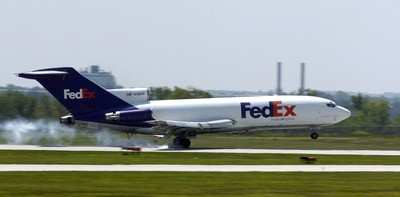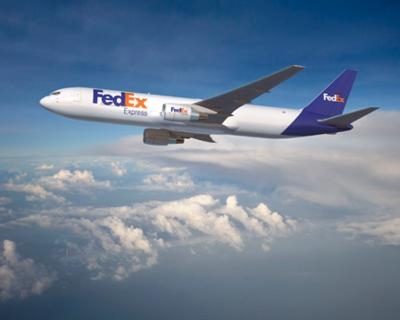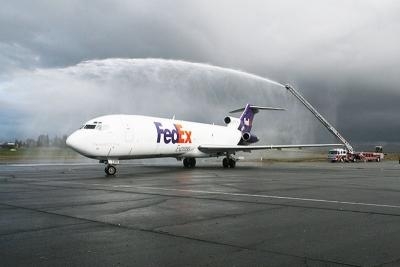Fleet Modernization Adds More Energy-Efficient, Lower-Emission Planes
For 35 years, Boeing 727 aircraft were a reliable workhorse for the world’s largest express transportation company. On Friday, the venerable 727 narrow-body freighter closed an enduring chapter in aviation history as FedEx becomes the last major carrier to retire the aircraft from service. The retirement is part of the company’s aircraft modernization strategy.

The 727’s domestic mission concluded at 1330 CDT as FedEx aircraft N481FE touched down at the FedEx Express World Hub at Memphis International Airport. Greeting its arrival were more than 1,000 company executives, air operations team members and other guests who marked the airplane’s historic last flight with a special ceremony. “For more than three decades, our Boeing 727 fleet was instrumental in our company’s domestic growth,” said David J. Bronczek, president and chief executive officer, FedEx Express. “Today, we are opening a new chapter for company growth and opportunity as we continue to modernize our global fleet with more technologically advanced, fuel efficient, lower emission cargo jets.”
Introduction of this larger, mid-size jet freighter to the FedEx fleet was made possible by deregulation of the airline industry in 1977, giving the upstart express carrier access to more domestic markets and bringing immediate operational efficiencies because of greater payload capabilities. FedEx operated only small Dassault Falcons before the industry was deregulated. An exemption then allowed a company to enter the common carrier business if its payloads were less than 7,500 pounds.
It was Jan. 14, 1978 when then-Federal Express took delivery in Memphis of its first 727 aircraft, which was purchased from a passenger airline. On that day, Frederick W. Smith, chairman, president and chief executive officer, FedEx Corp., told several hundred employees and guests at the delivery event, “Many people look at this airplane and believe that Federal Express has arrived at the end of a long road. This is not the end of anything. It is simply the beginning.”

Early FedEx acquisitions of used 727s from other carriers were followed by new aircraft purchases from Boeing, with the last 727 leaving the manufacturer’s assembly line and being delivered to FedEx in 1984. The express carrier at one point was the world’s largest operator of 727s, with 170 of the aircraft in its fleet at any one time.
FedEx began retiring its 727-200 fleet in 2007 and replacing them with more modern Boeing 757 airplanes. The retirement cycle accelerated under the fleet modernization program that through the last several years included more 757 freighters, as well as new Boeing 777 long-range freighters, which are the biggest in the FedEx fleet and the world’s largest twin-engine cargo aircraft. This fall, FedEx begins taking delivery of new Boeing 767 aircraft to replace its aging MD-10 freighters.
As with the other aircraft types being introduced, the 767s (pictured, above) will provide significantly improved reliability and are substantially more fuel-efficient and environmentally friendly than the aircraft they will replace. FedEx is committed to reducing its aircraft carbon emissions 30 percent by the year 2020 under its fleet modernization program. It expects to source at least 30 percent of its jet fuel from alternative fuels by the year 2030. “As we celebrate our company’s 40th anniversary, we can look back at an aircraft bloodline that has been impressive,” Bronczek said. “From the small Falcons, which served us well when the company was young, to our 727s, to what is now the largest fleet of express cargo aircraft in the world, our transportation capabilities for global customers is unmatched in the industry. Equally impressive are the innovation, technology and environmental benefits of the new aircraft we are
adding.”

Nearly half of the FexEx Express 727 fleet has been donated to aviation schools, colleges and local communities coast-to-coast in the last several years. From Anchorage to Austin, from Billings to Buffalo, from Sioux City to Shreveport and many points between, FedEx aircraft donations support school curriculums that are developing the next generation of aviation professionals. The donated aircraft are also being used for training by emergency response teams at local airports and fire departments.
For FedEx pilots like Capt. Chip Groner, who piloted a 727 for about 10 years, closing the door on 727 operations is a turning point not only for FedEx but for the aviation industry.
“The 727 was a mainstay aircraft and one of the most dependable we ever had in our fleet. More importantly, it was the plane that really put FedEx on the map as an overnight express carrier,” the 35-year FedEx crew member said. “It’s the end of an era, but it’s only natural because of changing technology that improves the fuel and operational efficiencies of today’s new aircraft. The 727, for many pilots, will always be the airplane that really brought the airline industry into the jet age.”
(Images provided by FedEx Express)
 ANN's Daily Aero-Linx (04.16.24)
ANN's Daily Aero-Linx (04.16.24) Aero-News: Quote of the Day (04.16.24)
Aero-News: Quote of the Day (04.16.24) Airborne 04.10.24: SnF24!, A50 Heritage Reveal, HeliCycle!, Montaer MC-01
Airborne 04.10.24: SnF24!, A50 Heritage Reveal, HeliCycle!, Montaer MC-01 Airborne 04.12.24: SnF24!, G100UL Is Here, Holy Micro, Plane Tags
Airborne 04.12.24: SnF24!, G100UL Is Here, Holy Micro, Plane Tags Airborne-Flight Training 04.17.24: Feds Need Controllers, Spirit Delay, Redbird
Airborne-Flight Training 04.17.24: Feds Need Controllers, Spirit Delay, Redbird





